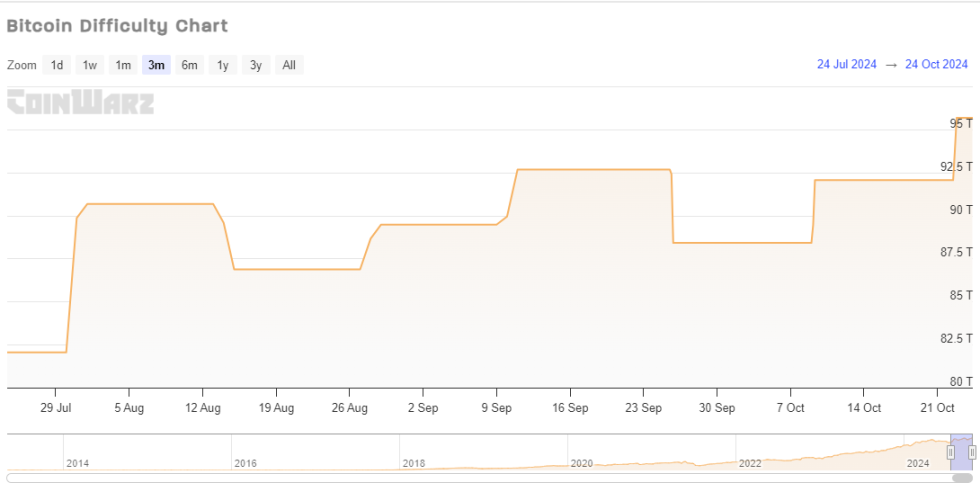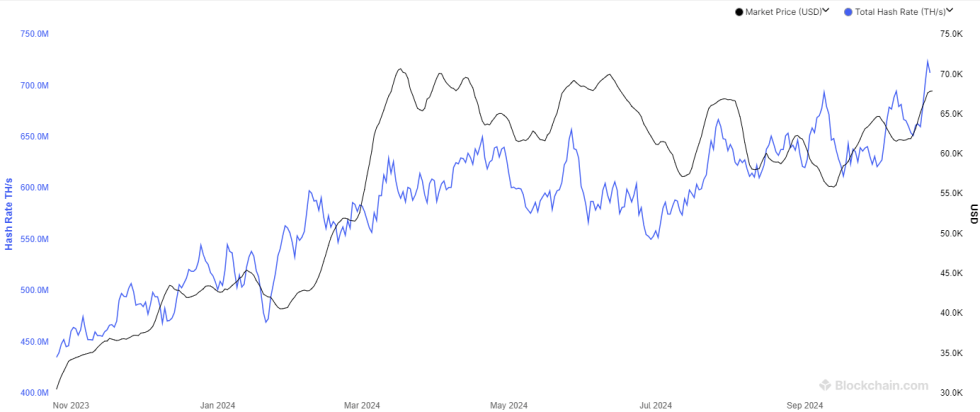ARTICLE AD
On-chain data shows that the Bitcoin Mining Difficulty has set a new all-time high (ATH) after the jump in the latest network adjustment.
Bitcoin Mining Difficulty Has Seen An Increase Of Nearly 4% Recently
According to data from CoinWarz, the BTC Difficulty has seen a positive adjustment recently. The “Difficulty” here refers to a metric that tracks how hard it is to mine blocks on the Bitcoin blockchain. Its value is measured in units of hashes.
This concept is baked into the BTC code, with automatic adjustments occurring roughly every two weeks. In these adjustments, the network can both increase and decrease the Difficulty.
How an adjustment might go depends on what the miners have been doing since the last adjustment. A core feature of the Bitcoin network is that the block time maintains a constant value of 10 mins per block.
Whenever the miners increase their total computing power, called the Hashrate, they naturally become faster at their task and produce blocks at a higher pace.
However, as the BTC blockchain intends to keep its block time limited to 10 mins per block, it increases the difficulty just enough in the next regular adjustment to bring the miners back down to the desired speed.
Similarly, when the Hashrate declines, the network decreases the Difficulty of easing things for the miners, allowing them to go back to producing at the standard rate.
Now, here is a chart that shows how the Bitcoin Difficulty has changed over the past three months:

The above graph shows that the Bitcoin Difficulty has seen a notable increase in the latest network adjustment. With this jump of about 4%, the metric has achieved a new ATH of over 95.6 trillion hashes.
The positive change is in response to the Hashrate reaching a new ATH on its 7-day average, as the chart below from Blockchain.com shows.

Now, why does the Bitcoin Difficulty exist at all? The reason behind that is that when block time is capped, one other metric is also constrained: the production rate of BTC.
When miners hash blocks on the network, they receive block subsidies as compensation. This reward is given out in freshly minted BTC, meaning that whenever these chain validators mine blocks, they produce new tokens.
In a world without the Difficulty feature, miners would be able to endlessly increase their computing power to receive rewards at a faster rate. Eventually, the cryptocurrency’s value would succumb to inflation.
Satoshi foresaw this scenario, so the Bitcoin creator came up with the innovative idea of the Difficulty to ensure that the asset’s supply growth remains predictable.
BTC Price
At the time of writing, Bitcoin is trading at around $67,500, down 1% over the past week.
Featured image from Dall-E, Blockchain.com, CoinWarz.com, chart from TradingView.com

 1 month ago
53
1 month ago
53 

